What's the Use?
A short recap
In the last few Meaning of Life posts, where I talked primarily about values, I made the argument that we view the world through our values. Our form of life determines what we value, and what we value determines what we see. We see only that part of the object that interests us. Often our interests differ: One animal's pet is another animal's mate. Sometimes our interests conflict: One animal's mate is another animal's meal. But how are objects differentiated? True, I value food: but how does my value enter into a relation with the outside world?
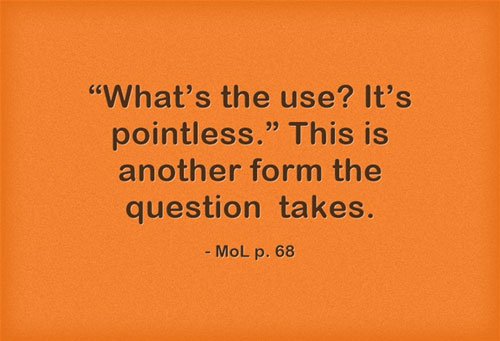
Made with quozio.
The question referred to is "what is the meaning of life?"
Enter the theory of use
The theory of use is essentially a theory about how we relate our values to the outside world. An organism that values ONLY food will see everything as either food or not-food: that is, everything can either be used as food, or it cannot be used as food. Whatever is unusable as food is meaningless. Essentially, this organism can really perceive only two things. There are only two objects in the world, as far as it is concerned. Now, if we add one more value, things get more complicated! The word is further divided. And what if these values conflict? I'll leave that for another post!
So an organism that can perceive more uses in things will see more objects. Thus the world gets populated.
And we can differentiate objects because we can use them in different ways.
Natural selection determines whether the perception of a new use in things will be preserved. If I can perceive that this thing X can be used as shelter, and if this new perception I have gained proves beneficial to my survival, then it will be preserved.

Source: Wikimedia commons.
Is this water, or waters? Chemically, it's waters: many H2Os. Very small organisms are sensitive to that. But for us it's water, cos we use them all in the same way, therefore there's no point differentiating. Compare racism, were we lump individuals together cos we only got one use for them: a platform to step onto and raise ourselves high above.
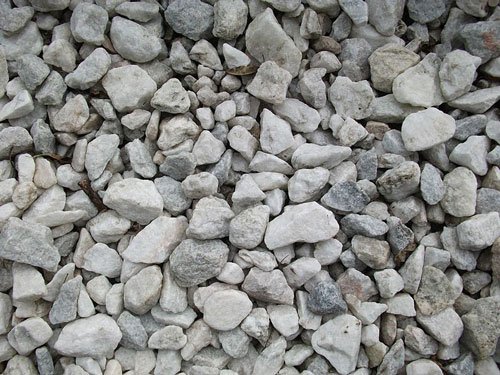
Source: Wikimedia commons.
Is this stone, or stones? Some are sharper than others, and can be used to cut meat better. Therefore it's plural. A much bigger organism will just view them as sand, and any one will be as good as any other.
Meaningful or meaningless?
The theory of use thus explains which circumstances make life meaningful or meaningless. A person who is ambitious above all, will view everyone and everything as either an aid or an impediment to his chosen goal. If most things prove to be an aid, his life will be meaningful. If most things prove to be an impediment, his life will be meaningless.
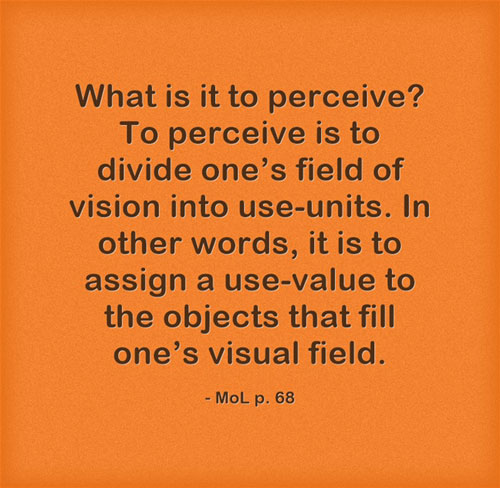
Made with quozio.
Why is there something rather than nothing?
There is the question, Why is there something there? Obviously, my theory of use is not an attempt to answer that question. That is a job for science, and I will not encroach on their turf. There is something to be said of retinas, of reflected light, of Big Bangs—in short, all that is science. What I am doing is translating all that talk into human talk, or subjective talk, or mental talk. There is, for instance, something to be said of neurons firing and interacting; but there is also something to be said of feelings. What we feel may just be chemicals in the brain, but chemicals in the brain are also just what we feel. Chemicals do not negate feelings, nor feelings chemicals. If anything, chemicals enable feelings. But although the scientific side of things has been worked out in detail, little has been said about the "mental" side of things. Much has been written, for instance, about how we are able to see objects, but little has been said about how this "seeing" is translated into consciousness (short of that most ingenious and profound statement: Consider what effects, which might conceivably have practical bearings, we conceive the object of our conception to have. Then, our conception of these effects is the whole of our conception of the object. This is the pragmatist maxim, formulated by Charles Pierce in 1902 in the Dictionary of Philosophy and Psychology, under "Pragmatic and Pragmatism.").
It has often been said that when we introspect our thoughts or feelings we fail to perceive neurons firing or interacting. The question that follows quite naturally, and yet has never been asked, is "Then what is it exactly that we perceive when we introspect our thoughts and feelings?" (The question has not been asked, because the answer is considered to be self-evident.) The closest we have ever come to answering that question in modern philosophical literature is the concept of "Qualia," which is to say that "What we perceive when we introspect our thoughts and feelings are nothing less than—brace yourselves—our very thoughts and feelings!" (or some similar question-begging statement). My own answer (to the extent that it is any different from Peirce's) [It will be obvious to the student of pragmatism that my answer is in fact quite different from Pierce's.] is that we perceive uses. What we call objects are "use-units."
What is a table?
The question of what individuates objects has long troubled philosophers. How are boundaries set or drawn? Why—or how—do we perceive this table as distinct from the air that surrounds it? What makes the air molecules external to, rather than part of, the object we call "table?" What makes the table-molecules (wood-molecules, metal-molecules, etc.) internal to the table? Why is it—or how is it—that the table-molecules belong to the table, whereas the air-molecules do not belong to it? Why do the wheels belong to the car rather than to the street? I do not believe science has answered these questions to our satisfaction. Science can only answer the question "What are tables made of?" after we have already defined tables—that is, after we have set the limits, the boundaries, and declared this to be table and that to be air.
The answer
My own answer, then, is that objects are grouped according to their uses, or usefulness. It is of no practical use to distinguish the many particles of air, so one lumps them together into a group and calls them, simply, "air." "This air here and that air over there" is an oddity of expression that, if at all intelligible, rarely, if ever, figures in our everyday conversation. On the other hand, distinguishing human individuals is quite important, and one even goes so far as to give each of them a different name—one rarely does the same with, say, one's pencils! Sometimes, however, for political or other reasons, the individual identities of a people matter less than their group identity. For instance, it might further one's goals to speak of Jews or Blacks or Whites rather than of individual persons. Use dictates use. That is, the usefulness of a thing or concept dictates how it will be used in language. If bricks are just as useful as one another, one will talk of bricks in general. If humans are not as useful as one another, one will talk of individuals, in this manner indicating and underscoring each person's special and particular importance, his uniqueness. Of course, one may still talk of different kinds of bricks, especially if one is in the brick business. For the building industry, distinguishing between different types of bricks is of paramount importance. It is useful to distinguish between different types of bricks. But this is only useful to people who are into bricks. For the rest of us, one brick is as good as any other brick, for the reason that there is no difference in usefulness between them. For my brick example here, for instance, any brick will do as well as any other, so any brick is as good as any other as far as I am concerned. This will remain the case so long as I am a writer. If—heaven forbid—I ever need to build my own house, bricks will begin to acquire a more nuanced usefulness, or use-value. The group "bricks" will then be divided into subgroups (though I doubt I will ever need to go so far as to christen individual bricks).
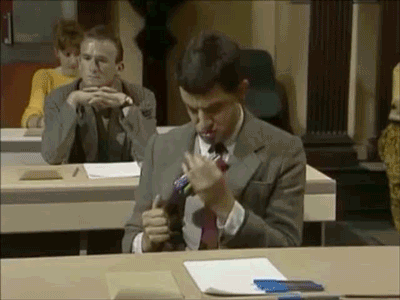
Some carry them in bulk.
Our form of life, then, determines what we see. Organisms that can consume humans as easily as they can munch on wood, and who only care about food, will be unable to distinguish between a man and the wooden chair he is sitting on. Virus-like organisms will view humans as vast colonies of cells rather than single entities. Etc.
Objectivism vs Subjectivism Redux
Does all this mean that all our designations are somehow arbitrary, not objective? Does it mean that there are no real boundaries in nature, that there is really only One thing? Well, to claim this would be to suggest that it is possible to assume a position that is use-less (the use-less here being interpreted as the objective). However, to occupy a position, to have consciousness, is to perceive a use in things. The being that perceives things use-lessly simply does not perceive them, nor does this being have any consciousness. If one can imagine what it is like to be a stone, and how objects look from its perspective—well, that is how objects really are, objectively! I find that the objective view of things is quite uninteresting, so it does not much occupy me.
The ship of Theseus
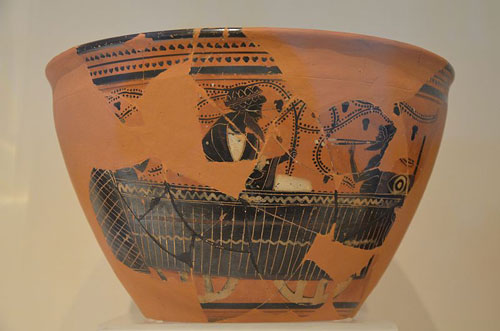-.jpg)
Source: Wikimedia commons
One of the many thought experiments that trouble philosophers is that of the wooden ship whose boards are gradually replaced. Instead of being thrown away, the old boards are reassembled and a new ship is built from them according to the specifications of the first. Eventually we have two ships, and we do not know which one of them is supposed to be the original ship. I suggest that this puzzle is perplexing for the same reason that the Necker Cube appears to be two cubes at once—or rather, alternating. The cube can be interpreted by our minds in two equally valid ways, so the mind alternates between the two. Similarly, I propose, at any given moment the old board is just as useful as the new board, so the mind has trouble deciding between the two, it has trouble objecting to the replacement, and ultimately it has trouble assigning an identity to the resulting ship. The problem arises because different use-values conflict. One may even use the example to argue against my theory, saying, for instance, "Here we have an object, the ship of Theseus, which has had all its component parts replaced, yet it retains the same use-value. Therefore, according to your own theory, the 'new' ship should be taken to be the actual ship of Theseus, whereas the reassembled ship should be taken to be mere firewood—for that is all it is useful for. On the contrary, we find we cannot decide which of the two is the actual ship. Therefore your theory is false." But actually the reassembled ship does have some use-value, other than its being useful as firewood. It has museum-exhibit value, for instance. Our tendency to assign an almost "holy relic" value to certain things—the same tendency that keeps our flat-apartments stuffed with old things we refuse to throw away—is the same tendency that keeps us attached to the reassembled ship of Theseus. The "new" ship, on the other hand, has seafaring value, since it is still seaworthy. I have not provided an exhaustive analysis of the use-value of the two ships, but what I am saying is this: the conflict between the use-value of one ship and the use-value of the other ship is the cause of the paradox. If one use-value outweighed the other use-value (if one of the Necker Tube interpretations was much stronger than the other), then we would have a solution to our paradox—we would not vacillate. As it is, the paradox is essentially asking us whether a pound of cotton is heavier than a pound of iron—with the difference that the ship of Theseus paradox takes advantage of the fact that we are unwilling to grant two different objects the same identity, whereas one may consistently say that one pound of cotton and one pound of silver are equally heavy.
Who am I?
How about the persistence of identity through time? Regarding spatial grouping, I have already said that we tend to group things together when separately they would lack any use-value. Thus we see sand instead of grains of sand. We see water instead of water molecules. Temporal groupings follow the same pattern: we see the same person (Tom) on Monday and on Tuesday, because the difference in use-value between Monday-Tom and Tuesday-Tom is not sufficiently great to justify giving them different names. Monday-Tom and Tuesday-Tom are identical because they have an identical use-value. But if Tuesday-Tom undergoes a sudden and dramatic change (say, is involved in a car accident that causes him to lose his memory), then this alters his use-value significantly (he may not, for example, be able to fulfill his duties as a parent or a husband any longer). After this dramatic change, we have difficulty perceiving Tom as the same person, and although we may use the same name to refer to him, in our minds the new Tom is a mere namesake of the old.
Conclusion
The question, then, "Why do I see that object there?" has two equivalent answers. One is scientific, and what it does is provide a causal explanation: the light of the sun hits the object, some of it is reflected and hits the retina, etc. The other answer is the philosophical, the mental, the subjectivist: we perceive it because it is useful to us. Why is it useful to us? The answer is again scientific—more specifically, it belongs to the jurisdiction of evolutionary biology and developmental psychology.
Curtain
Almost all the above is actually a single diary entry. The diary entry that follows it says: "A well-written and insightful journal entry makes the day worthwhile." You see, I had managed to put some of my time to good use. Just another example of how people find - or create - meaning!
This completes the 12th installment of the Meaning of Life series. In case you missed the other episodes:
Part 11: Words VS Actions
Part 10: Mothers and Egos!
Part 9: Can People Share Ownership of the Same Body?
Part 8: Against Subjectivism - Is Everything Relative?
Part 7: The Value-Laden View of Life
Part 6: I Am Therefore I Harm
Part 5: Nietzsche vs Christianity: Are Christians Nihilists?
Part 4: Can we desire death?
Part 3: Are nihilists being honest when they say life has no value?
Part 2: Does death make life meaningless?
Part 1: Is it possible to be a nihilist?
I'll see you in the next episode, where I will continue exploring my theory of Use, one of the three theories in the book that explain how life may appear meaningful or meaningless to us.

Come join us on Discord! https://discord.gg/7qyarFD
I have not studied the subject as you and some of those making comments, so some of it gets too intricate, leaving me a bit confused, even when I think I have grasped the basics.
As I'm reading, I cannot help wonder at how philosophers differ from non-specialised philosophers, for most of us tend to link our way of thinking to emotions. I would not dare claim that either is wrong; we need, to function realistically in life, to have the ability to use both view. Perhaps it is also that by the actual alternating, we arrive at new insights and new uses are created for us to theorise on?
I was amused to read your comment
That sounds very human of you :)
I have learnt a few things from this post, which means it is given value by me, even if all I can reward you with is a thank you.
+++
I was wondering, what if you meet an old man, somewhere in the hills of Cyprus, and you find out that he has lived for over 2,000 years.
Though not educated (formal education), he has given much thought to what life is and what gives meaning to our existence. Some of his thoughts seem to have originated from thoughts of philosophers of other ages, but they have evolved in sometimes weird ways and some of it that mostly originates from him, is so different it does not make much sense to anyone of this age.
Would you feel it is important to study and learn from him? Do you think it would alter the way you see philosophical subjects?
Now, let us change the scenario slightly. Think of an ancient philosopher you highly respect; whether Socratis, Plato or anyone else, of any national origin. You meet him and find he has changed, his thinking in some ways far more intricate, spiralling in ways that confuse you and in other ways, he has simplified many of his theories so that he has little time for those who have not.
Would you want to learn from him, despite the risk of the changes perhaps alienating you from the man you were and all other philosophers of our time?
(Sorry, but as you probably know of me, I love playing games of the mind...not for others, but for myself, so that I sometimes find I change. Maybe I grow, evolve, and maybe in fact, I actually devolve - but at least I don't remain what I am for too long.)
Philosophy welcomes anyone, as well as science. Being a professional philosopher matters to the extent that other people's opinions matter. What you describe about old philosophers and mountains, is what I do whenever I pick up a book! I can go back 2000 years ago, or travel to another continent, etc. I would listen to anything your non-specialized philosopher has to say. After all, I read a lot, and reading is by its nature mostly listening.
I actually get your comment quite often in different forms, I mean the gist of it, which I believe to be "can't non-philosophers philosophize?" or "aren't we all philosophers?"
The thing is, practically, you can discover all the truths of mathematics by yourself, but you'll benefit if you study others who went over it already. It will save you time, and keep you from "wasting" your time rediscovering other people's thoughts. If I were an immortal I'd rather rediscover it all by myself, but we don't have that luxury of time, so we must cut corners, i.e. study, either in an academic institution or independently but with similar rigorousness.
In general, I would learn from anyone, and we should all learn from everyone. Sometimes though people are just inconsistent. There are rules of thought just as there are rules of math. Sometimes people are even downright mischievous and dishonest. We should recognize those cases, so as to release ourselves from the tutelage and/or influence of these people as quickly as possible!
As always, I'm thankful for the reading and the comment, hopefully my reply is up to par!
Hey @alexander.alexis,
finally found the time to take a look at your posts, and I am really glad I did. I like the article a lot, and might add another view: You talk about the table, and what it consists of. An answer would be -"nothing".
As you showed, it is hard to distinguish what belongs to the table, which molecules, it is hard to determine why the wheels belong to the car and not the street - except if you again simplify it to a concept.
A table is inherently nonexistant, as it is gone as soon as you take the legs away. There is no table present anymore, just 4 legs and a piece of wood. Your concept made it a table, especially if you have use for the table. As long as this concept is valid, you form a "relationship" with said table - you like or hate it, use it or perceive it as useless. If you lose the concept, because you want to build something else out of the table, this table is gone and suddenly only its parts exist and you form a relationship with them. So before grouping it into use-units, you actually need to create whatever you want to categorize.
In conclusion, the objects themself lack actual existence, as they are infinitively(at least concerning their use-value to us) dividable. Adding this variable of concept-forming or creating objects, the usefulness is relative(it was before as well, as you pointed out). As concepts are a product of our character and thoughts (I will now stop at this level) and subject to a constant change and fluidity, the absolute perception is also relative and changing, an inherent existence (=an unchangable, non-dependant nature) is not present.
Asking again:
"Why is there something?"
Is in itself false, as the possibility of true existance without cause can not be shown (neither scientifically nor philosophically). The same goes for "Who am I?" The thought of being a non-caused entity in itself is false, and therefore deceptious. Thus, answering both questions : there is, and is not, nothing, which lacks true existance. Simple! ;)
Or so I think.
Good thoughts!
A lot of it comes pre-created for us by nature. Let's say you meet with a new object. First thing you notice is it has shape and size. Why do you notice that? Because if you don't and you walk toward it, you might hurt your leg, say. Plants don't have vision because they don't move fast enough. Sense of touch is more appropriate in their case, because they're so slow that if there's any distance between you and them, it's like you're not there.
So first you see the object and its shape and size and colors (could be poisonous) etc. This comes by nature. The rest is more a result of nurture and more in line with what you've said.
Your response of course merits further thought and commenting. It's true everything is very fluid. You can never step into the same river twice and all that. What makes the river the same river? Its usefulness to us is the same. The atoms that make us up change every day, but Monday-Tom and Tuesday-Tom have equal usefulness to his wife and children etc. Reality's constant change has been troubling philosophers for millennia, hopefully this idea of "use" can explain somewhat how we give (lasting) identities to objects.
Again, not doing justice to what you said exactly, which is about "nothingness/emptiness" and all that, but it's rather late so I'll end it here!
Thanks for reading!
I agree for the most part! It would be interested to see if a human being would react to shapes and colors without learning about them, meaning without anyone telling the child what is useful or not.
Also, Monday-Tom and Tuesday-Tom are even more fluid, as maybe Tuesday-Tom decides to leave his family and thus ends his usefulness. But someone leaving was not useful for the family beforehand (if we at least keep the concept of family=useful), so in this case the deed defines the person, and in a way the future influences the past. A "good" (yay, more concepts) person cannot do "bad" deeds, likewise can a "bad" person not do "good" deeds. But we know this is not true, so logically the result would be that the person either changes frequently between good and bad, or the done deed defines the person. Having this uncertanty, "useful" and "not-useful" are way better concepts than "good" and "bad".
Thank you for sparking those thoughts!
You've one leg in science and the other in "philosophy" (thinking about things in the macro-scale). That's good! 👍
As a good friend of mine said: "
Living life is like running a race. Science (or the materialistic view) is one leg, philosophy is the other. Most people try to run their race with only one leg, thats why so many stumble and fall. You need both."
That sounds like a famous quote!
Are you familiar with Husserl and his phenomenology? Interestingly enough, he echoes some of your points. (Although his approach is quite different.)
He basically states that consciousness is predicated on intentions. That the reality that we perceive isn't made out of objects, but out of the meaning of the objects that in that point in time are relevant to us. Or, to put in your words, we don't see the object, but the usefulness of the object.
I feel that this is a very powerful idea indeed. One that seems right, just by looking at how people practically act in the world.
I was actually thinking while making the post, about how the word "phenomenology", just etymologically, seems to apply to what I'm doing, simply because I'm trying to describe things from how they look to consciousness, tho there might be an equivalent scientific description of the same, well, phenomena!
I never read Husserl, though I've encountered him through other books or documentaries or what not. At uni I avoided anything of the sort cos it all sounded impossible to comprehend. Only similar author I read is Heidegger, and again I probably understood only 10% of what I read. There are certain things here and there, tho, that strike me as thoughts of genius, and that chime well with some of my own approaches. For that reason I'd like to devote time in the future to studying these authors I've left behind. But it's gonna be a hard task and a tall order!
Fascinating perspective and very world shifting in its clarity! Some translate the Genesis "Knowledge of Good and Evil" as "Knowledge of Function and Disfunction." One could conceptualize the idea as "Knowledge of Use and Disuse" in creating the subjective universe from the Creator's design.
All of the "uses" seem to also suggest an underlying purpose for an individual's life. How to determine that purpose, or whether there is a purpose other than survival, would be the logical extension along this line of query.
One critique:
I would posit that "why" is not the line of query science can answer; it is more the question of philosophy or religion. Science is concerned only with "how" and "what." After all, to paraphrase Frank Herbert, has not religion claimed monopoly on purpose of creation?
I think Aristotle defined the Good in accordance to the function of a human or animal. A human or animal then lives well - according to the Good (you can add or take an 'o' here) - if he successfully discharges this function.
With my theory I make a similar claim, that the uses determine what an animal finds meaningful. So if you, say, only care about sex when it comes to women, then the only meaningful interaction you can have with them is that one, and if you can't do that then you find interactions with them meaningless, and that's one less meaning-unit to tally when you count the meaningfulness in your life.
True. I was providing a causal why rather than a teleological one.
But surely, there is an objective standard upon which to measure our subjective choices of meaning? I guess, in a sense the end goal, or purpose, determines use-paradigm.
It was important to me to make my theories very inclusive, meaning that a beetle or cockroach could also have meaning in life, not just humans, and not everything would be subservient to the meanings we humans deem most worthy.
I tried to make my theory as "scientific" as possible, but expressed using non-scientific language. I tried to get into the skin of any organism, and see what determines meaning in its life. "Use" is one of the three main ideas I came up with. The other two I called "investment" and "contingency." All three explain how our values are related to the world, how for example if I value sex but can't use anything as sex, my life is less meaningful, how if I value health but my health is only contingently associated with me, then that "falsifies" my value, creating meaninglessness, and how values can also be seen as an investment, as a minus sign that needs to be made into a plus sign or at least an equals sign if life is to have meaning. The life of the dung-rolling beetle can be meaningful if it can satisfy its value of rolling dung. Us humans calling its life meaningless because it can't appreciate Beethoven is a misunderstanding: a beetle hasn't invested in a brain that can appreciate classical music, so its life is not less meaningful for not being able to appreciate it.
But you can rightly call a human life less meaningful for not being able to appreciate great art, because it has invested in that machinery that we can (scientifically) tell is partly "made for" appreciating art. In this sense, meaning is not subjective: you can say to someone "your life is less meaningful for never having loved/read Shakespeare/listened to Beethoven etc.", no matter how much he disagrees with you.
I will explore all these ideas in later posts!
Wow, such challenge! I guess I am more of a partisan for Heraclitus: all is fire . . . no, man is measure of all things. I did not even consider that other creatures had "meaning" to their lives.
I look forward to the next "Life" edition.
Lots of great stuff here. You've got my head buzzing about the way we group our perceptions around "uses." I remember reading some book a long time ago that defined a living creature as anything that "brings forth a world." That is, if it reacted to stimuli and responded to environmental pressures, that creature's world consisted of those stimuli and pressures. It seems to tie in with your uses argument.
It's spooky how we seemed to be thinking about the same things at the same time today. I was just writing about the subjectivity of perception, and then the way we replace the cells in our bodies, all while you were writing about replacing a ship board by board and how we categorize objects as objects.
And now I've got Pink Floyd running through my head.
Interesting phrasing. Can you locate that book? A google search gives me a 'Santiago theory'.
The theory as you go on to explain it sounds more like empiricism, the idea that we are blank slates that get written on depending on what we encounter.
I've been awfully busy lately and haven't been giving as much attention to your posts! I vote them when I can, but don't read! I'll go and read the one you mentioned now.
No worries - I've got to run some errands at the moment too. I'll see if I can track down that title.
Can I put my dick in it?
Will it get me drunk?
Can alcohol be absorbed through the skin?
Congratulations! This post has been upvoted from the communal account, @minnowsupport, by Alexander Alexis from the Minnow Support Project. It's a witness project run by aggroed, ausbitbank, teamsteem, theprophet0, someguy123, neoxian, followbtcnews/crimsonclad, and netuoso. The goal is to help Steemit grow by supporting Minnows and creating a social network. Please find us in the Peace, Abundance, and Liberty Network (PALnet) Discord Channel. It's a completely public and open space to all members of the Steemit community who voluntarily choose to be there.
Congratulations @alexander.alexis! You have completed some achievement on Steemit and have been rewarded with new badge(s) :
Click on any badge to view your own Board of Honor on SteemitBoard.
For more information about SteemitBoard, click here
If you no longer want to receive notifications, reply to this comment with the word
STOP